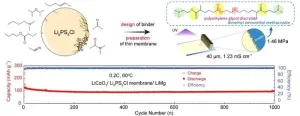(Press-News.org) Numerous studies have raised alarms about how the COVID-19 pandemic disrupted learning, development and mental health among school-aged children. But few have focused on the effects felt by the 22 million children under age 6 who were not yet in school.
Now a study published Feb. 5, 2024, in JAMA Pediatrics, led by researchers at Cincinnati Children’s in collaboration with the Cincinnati Public Schools, documents the pandemic’s harmful effects on kindergarten readiness. The findings are based on data from about 8,000 kindergartners who took a state-required Kindergarten Readiness Assessment (KRA) in 2018, 2019, and 2021–including 3,200 children who receive care through Cincinnati Children’s primary care clinics.
What the researchers found was concerning. Only 30% (or 3 in 10) of Cincinnati Public Schools students were assessed as kindergarten-ready in 2021, a significant decline from 40% (or 4 in 10) assessed as ready in 2018. Researchers found a similar pattern in the 3,200 children who receive care through Cincinnati Children’s primary care sites: 21.5% deemed ready to learn in 2021 compared to 32% in 2018.
“This means that 7 of every 10 children in the Cincinnati Public Schools were considered not ready to learn when they entered kindergarten during the pandemic. This trend was even more pronounced among the more-disadvantaged, Medicaid-covered children we see in our primary care clinics,” says the study’s lead author Kristen Copeland, MD, Division of General and Community Pediatrics.
“It will take intense effort on multiple levels to help these children overcome this disruption,” Copeland says.
Pandemic amplified existing gaps
The research team drilled down on the KRA scores that involved patients cared for in Cincinnati Children’s pediatric primary care centers. This involved linking the KRA scores to other screening assessments of the child’s development and early reading exposures, as well as social, socio-economic environmental, and family characteristics and factors.
These factors included the family’s financial hardships and food security, primary language spoken at home, the child’s race and ethnicity, and maternal stress or depressive symptoms—all known to be linked to a child’s readiness to succeed in kindergarten.
The readiness assessment includes a series of 27 questions and tasks administered by teachers to measure a child’s skills in early reading, early math, gross motor and fine motor tasks, self-regulation and attention. The Cincinnati Children’s study identifies several factors generally associated with lower levels of kindergarten readiness, including:
Child previously failed a developmental screening assessment between 18 months and 5 years of age
Child insured by Medicaid (a proxy measure of low family income)
Hispanic vs. non-Hispanic ethnicity
Family requires a medical interpreter during clinic visits
Child sex is male
Parents report rarely reading to the child
Family previously reported experiencing food insecurity
“To our knowledge, this is among the first and the largest studies to use real-world data to analyze protective and risk factors for school readiness among a population that has been traditionally reluctant to participate in research studies,” Copeland says.
Cause for optimism
While the lower readiness scores can be seen as distressing, the research team says many of the factors that limit readiness can be addressed because a structure for doing so already exists.
“The good news is that we identified several factors that predicted later kindergarten readiness that we already measure during primary care visits,” Copeland says. “Furthermore, we have in primary care ways to quickly get kids the additional help they need, be it speech therapy, legal aid, benefits assistance, food pantry or produce delivery, or hands-on assistance in enrolling in preschool, high quality childcare and Head Start.”
There is great potential to enhance linkages among community organizations to help families support pre-kindergarten learning and development for their children.
The co-authors say this study reflects an ongoing partnership between Cincinnati Children’s and Cincinnati Public Schools that has built bridges over the years to overcome many existing obstacles to data sharing. Expanding such relationships to other school districts and building similar collaborations in other cities will likely help even more children affected by the pandemic get back on track in school.
“These cross-sector linkages highlight the urgency for primary care organizations to become more involved in promoting equitable early child development, not just in Cincinnati but across the United States,” says co-author Robert Kahn, MD, MPH, director of the Fisher Child Health Equity Center at Cincinnati Children’s.
About the study
Copeland is a member of the Fisher Child Health Equity Center, the Division of General and Community Pediatrics and the James M. Anderson Center for Health Systems Excellence at Cincinnati Children’s. In addition to Copeland and Kahn, co-authors included Lauren Porter, PhD, Michelle Gorecki, MD, MPH, Allison Reyner, MS, and Cynthia White, MSc, RRT-NPS, CPHQ.
END
Study confirms fears that COVID pandemic reduced kindergarten readiness
Researchers at Cincinnati Children’s find disrupted learning and development was felt most among disadvantaged families. Recommendation: improve linkages between schools, primary care, and other services
2024-02-05
ELSE PRESS RELEASES FROM THIS DATE:
MSU making voice-activated artificial intelligence more accessible
2024-02-05
MSU has a satellite uplink/LTN TV studio and Comrex line for radio interviews upon request.
EAST LANSING, Mich. – As artificial intelligence technology advances, one area lags behind: voice-activated AI. For the more than 80 million people who stutter, voice AI technologies, which are increasingly being used in job hiring practices, can still be impossible to navigate.
HeardAI, a multidisciplinary project from Michigan State University, Western Michigan University, and the nonprofit Friends: The National Association of Young People Who Stutter, has advanced to Phase 2 of the National Science Foundation’s Convergence Accelerator program to ...
Lowder & Foudray receive funding for Fairfax county peer recovery services evaluability assessment
2024-02-05
Lowder & Foudray Receive Funding For Fairfax County Peer Recovery Services Evaluability Assessment
Evan Marie Lowder, Assistant Professor, Criminology, Law and Society, and Chelsea Foudray, Postdoctoral Research Fellow, Criminology, Law and Society, received funding from County of Fairfax for: "Fairfax County Peer Recovery Services Evaluability Assessment."
Lowder and Foudray are laying the groundwork for a formal evaluation of Fairfax County Peer Recovery Services (PRS) programming.
For ...
Watching the enzymes that convert plant fiber into simple sugars
2024-02-05
This work was adapted from articles by Elizabeth Boatman and Emily C. Dooley.
Research from Lawrence Berkeley National Laboratory (Berkeley Lab), Lawrence Livermore National Laboratory (LLNL), and UC Davis sheds new light on how to access the sugars locked up in plants to produce petroleum-free fuels, chemicals, and medicines.
Using microbes to convert grasses, weeds, wood, and other plant residues into sustainable products will be key to achieving carbon neutrality and could even help eliminate drug shortages. But cellulose, the tough tissue that makes up a large proportion of herbaceous and woody plant ...
Argonne’s Lin X. Chen receives the Mildred Dresselhaus Guest Professorship Award from the University of Hamburg
2024-02-05
Lin X. Chen, a chemist at the U.S. Department of Energy’s Argonne National Laboratory, has received the Senior Prize as part of the two 2023 Mildred Dresselhaus Guest Professorship Awards from the University of Hamburg, Germany. The award recognizes outstanding international women scientists and offers an opportunity for awardees to conduct research at the Hamburg Centre for Ultrafast Imaging Cluster of Excellence. Chen has held a joint appointment as professor of chemistry at Northwestern University since 2007.
“I am very honored ...
Hart receives funding for boot camp
2024-02-05
Hart Receives Funding For Boot Camp
David M. Hart, Professor, Schar School of Policy and Government, received funding for: "2024 Climate-Tech Innovation Policy 'Boot Camp' for Early Career Researchers."
Via this effort, Hart will build interpersonal bridges across the gap that separates the policy and research communities, sensitize researchers to the practical considerations that shape energy and climate innovation policy, and create new inter-disciplinary linkages among early-career researchers.
His long-term objective is to shape the research agendas of the participating scholars, so that they contribute as fully as ...
Max Planck Institute for Informatics and Google are expanding their strategic research partnership on Artificial Intelligence
2024-02-05
The Max Planck Institute for Informatics and Google deepen their strategic research partnership. With additional financial support from the U.S. IT company, the “Saarbrücken Research Center for Visual Computing, Interaction and Artificial Intelligence (VIA)”, which was only launched in November 2022 at the MPI in Saarbrücken, is establishing a new research area “Vision and Language Models (VLMs)”, led by Professor Bernt Schiele. This was presented by the Max Planck Directors Bernt Schiele and Christian Theobalt together with Google representatives to Saarland ...
Longitudinal study links PFAS contamination with teas, processed meats and food packaging
2024-02-05
New research is shedding light on food and beverage products linked to per- and polyfluoroalkyl substances, or PFAS, and suggesting potential solutions for protecting the public.
PFAS are known to be harmful to health: They can disrupt hormones, weaken bones and increase disease risk. Sometimes called “forever chemicals” because they take so long to break down, PFAS are used in fabrics, furniture and other household items—but they are also hard to get rid of. Recent tests now trace the chemicals to livestock, drinking water and food packaging, but little is known about the extent of that contamination.
A new study, funded in part ...
SwRI’s CHEDE-9 consortium expands decarbonization research priorities
2024-02-05
SAN ANTONIO — February 5, 2024 - Southwest Research Institute has launched the latest phase of the transportation industry’s longest running commercial vehicle research consortium. Building on more than 33 years of research and development, the Clean Highly Efficient Decarbonized Engines 9 (CHEDE-9) consortium has expanded its scope from diesel-engine-focused research to a range of internal combustion engines and hybrid solutions.
Formerly known as the Clean High-Efficiency Diesel Engine consortium, CHEDE-9 focuses on research of low- and net-zero carbon dioxide (CO2) transportation technologies for light-duty passenger vehicles, heavy-duty commercial vehicles and large ...
Stable binder boosting sulfide solid electrolyte thin membrane for all-solid-state lithium batteries
2024-02-05
They published their work on Feb. 2 in Energy Material Advances.
"The development of thin sulfide solid electrolyte layers is imperative" said paper author Xiayin Yao, a professor at the Laboratory of All-solid-state rechargeable battery, Ningbo Institute of Materials Technology and Engineering, Chinese Academy of Sciences (CAS). "Although sulfide solid electrolyte is easy densified through cold pressing method, the freestanding membrane generally show a thickness greater than 500 μm. The thick and heavy layer of sulfide electrolyte results in less than ...
Green steel from toxic red mud
2024-02-05
The production of aluminium generates around 180 million tonnes of toxic red mud every year. Scientists at the Max-Planck-Institut für Eisenforschung, a centre for iron research, have now shown how green steel can be produced from aluminium production waste in a relatively simple way. In an electric arc furnace similar to those used in the steel industry for decades, they convert the iron oxide contained in the red mud into iron using hydrogen plasma. With this process, almost 700 million tonnes of CO2-free steel could be produced from the four billion tonnes of red ...
LAST 30 PRESS RELEASES:
Prevalence of over-the-counter and prescription medication use in the US
US child mental health care need, unmet needs, and difficulty accessing services
Incidental rotator cuff abnormalities on magnetic resonance imaging
Sensing local fibers in pancreatic tumors, cancer cells ‘choose’ to either grow or tolerate treatment
Barriers to mental health care leave many children behind, new data cautions
Cancer and inflammation: immunologic interplay, translational advances, and clinical strategies
Bioactive polyphenolic compounds and in vitro anti-degenerative property-based pharmacological propensities of some promising germplasms of Amaranthus hypochondriacus L.
AI-powered companionship: PolyU interfaculty scholar harnesses music and empathetic speech in robots to combat loneliness
Antarctica sits above Earth’s strongest “gravity hole.” Now we know how it got that way
Haircare products made with botanicals protects strands, adds shine
Enhanced pulmonary nodule detection and classification using artificial intelligence on LIDC-IDRI data
Using NBA, study finds that pay differences among top performers can erode cooperation
Korea University, Stanford University, and IESGA launch Water Sustainability Index to combat ESG greenwashing
Molecular glue discovery: large scale instead of lucky strike
Insulin resistance predictor highlights cancer connection
Explaining next-generation solar cells
Slippery ions create a smoother path to blue energy
Magnetic resonance imaging opens the door to better treatments for underdiagnosed atypical Parkinsonisms
National poll finds gaps in community preparedness for teen cardiac emergencies
One strategy to block both drug-resistant bacteria and influenza: new broad-spectrum infection prevention approach validated
Survey: 3 in 4 skip physical therapy homework, stunting progress
College students who spend hours on social media are more likely to be lonely – national US study
Evidence behind intermittent fasting for weight loss fails to match hype
How AI tools like DeepSeek are transforming emotional and mental health care of Chinese youth
Study finds link between sugary drinks and anxiety in young people
Scientists show how to predict world’s deadly scorpion hotspots
ASU researchers to lead AAAS panel on water insecurity in the United States
ASU professor Anne Stone to present at AAAS Conference in Phoenix on ancient origins of modern disease
Proposals for exploring viruses and skin as the next experimental quantum frontiers share US$30,000 science award
ASU researchers showcase scalable tech solutions for older adults living alone with cognitive decline at AAAS 2026
[Press-News.org] Study confirms fears that COVID pandemic reduced kindergarten readinessResearchers at Cincinnati Children’s find disrupted learning and development was felt most among disadvantaged families. Recommendation: improve linkages between schools, primary care, and other services




